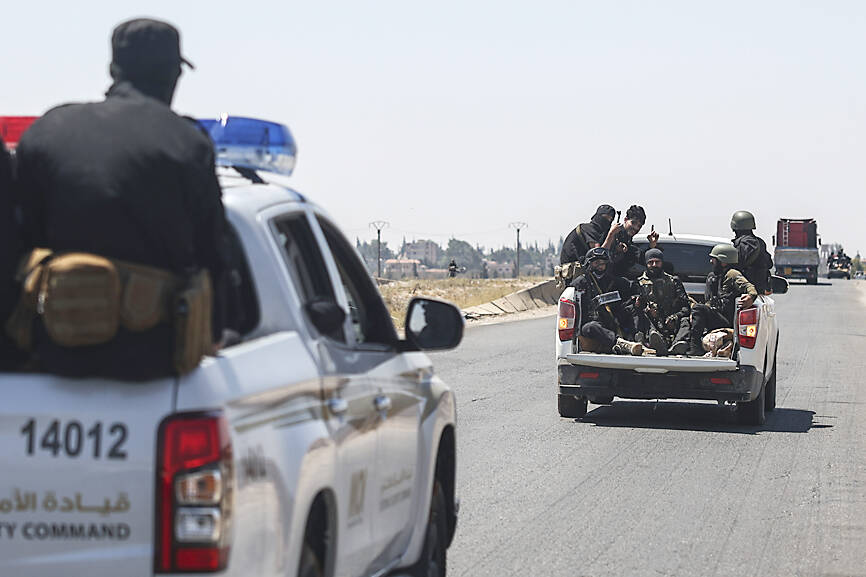Syrian President Ahmad al-Sharaa yesterday urged Sunni Muslim Bedouin groups to “fully commit” to a ceasefire aimed at ending clashes with Druze-linked militias that have left hundreds dead and threatened to unravel the country’s post-war transition.
This comes as government forces, initially sent to restore order, but effectively sided with the Bedouins against the Druze, were redeployed to halt renewed fighting that erupted late on Thursday in the southern province of Sweida. The violence has also drawn airstrikes against Syrian forces by neighboring Israel before a truce was reached.
In his second televised address since the fighting started, al-Sharaa blamed “armed groups from Sweida” for reigniting the conflict by “launching retaliatory attacks against the Bedouins and their families.” He also said Israeli intervention “pushed the country into a dangerous phase.”

Photo: AP
Israel had launched dozens of airstrikes on convoys of government fighters and even struck the Syrian Ministry of Defense headquarters in central Damascus, saying it was in support of the Druze, who form a substantial community in Israel and are seen as a loyal minority, often serving in the Israeli military.
Reports had surfaced of Syrian government-affiliated fighters executing Druze civilians and looting and burning homes over the four-day violence.
US envoy to Syria Tom Barrack earlier yesterday announced that Israel and Syria had agreed to a ceasefire. Al-Sharaa made no direct reference to the agreement, but said “American and Arab mediations stepped in” to restore calm.
Addressing the Bedouins, al-Sharaa said they “cannot replace the role of the state in handling the country’s affairs and restoring security.”
He also said: “We thank the Bedouins for their heroic stances but demand they fully commit to the ceasefire and comply with the state’s orders.”
Meanwhile, a prominent Druze leader, Sheikh Hikmat al-Hijri, who opposes the current government and has distanced himself from the two ceasefires announced on Tuesday and Wednesday last week, said an agreement, brokered under the sponsorship of guarantor states, has several measures aimed at de-escalating tensions in Suweida.
This includes the deployment of General Security checkpoints outside the province’s administrative borders to contain clashes and prevent infiltration, a 48-hour ban on entry by any party into border villages, and safe, guaranteed passage for remaining members of the Bedouin groups still inside the province.
Al-Sharaa reiterated that Suweida “remains an integral part of the Syrian state, and the Druze constitute a fundamental pillar of the Syrian national fabric,” vowing to protect all minorities in Syria.
He also thanked the US for its “significant role in affirming its support for Syria during these difficult times,” as well as Arab countries and Turkey, who mediated Wednesday’s truce.

Taiwan is projected to lose a working-age population of about 6.67 million people in two waves of retirement in the coming years, as the nation confronts accelerating demographic decline and a shortage of younger workers to take their place, the Ministry of the Interior said. Taiwan experienced its largest baby boom between 1958 and 1966, when the population grew by 3.78 million, followed by a second surge of 2.89 million between 1976 and 1982, ministry data showed. In 2023, the first of those baby boom generations — those born in the late 1950s and early 1960s — began to enter retirement, triggering

ECONOMIC BOOST: Should the more than 23 million people eligible for the NT$10,000 handouts spend them the same way as in 2023, GDP could rise 0.5 percent, an official said Universal cash handouts of NT$10,000 (US$330) are to be disbursed late next month at the earliest — including to permanent residents and foreign residents married to Taiwanese — pending legislative approval, the Ministry of Finance said yesterday. The Executive Yuan yesterday approved the Special Act for Strengthening Economic, Social and National Security Resilience in Response to International Circumstances (因應國際情勢強化經濟社會及民生國安韌性特別條例). The NT$550 billion special budget includes NT$236 billion for the cash handouts, plus an additional NT$20 billion set aside as reserve funds, expected to be used to support industries. Handouts might begin one month after the bill is promulgated and would be completed within

NO CHANGE: The TRA makes clear that the US does not consider the status of Taiwan to have been determined by WWII-era documents, a former AIT deputy director said The American Institute in Taiwan’s (AIT) comments that World War-II era documents do not determine Taiwan’s political status accurately conveyed the US’ stance, the US Department of State said. An AIT spokesperson on Saturday said that a Chinese official mischaracterized World War II-era documents as stating that Taiwan was ceded to the China. The remarks from the US’ de facto embassy in Taiwan drew criticism from the Ma Ying-jeou Foundation, whose director said the comments put Taiwan in danger. The Chinese-language United Daily News yesterday reported that a US State Department spokesperson confirmed the AIT’s position. They added that the US would continue to

One of two tropical depressions that formed off Taiwan yesterday morning could turn into a moderate typhoon by the weekend, the Central Weather Administration (CWA) said yesterday. Tropical Depression No. 21 formed at 8am about 1,850km off the southeast coast, CWA forecaster Lee Meng-hsuan (李孟軒) said. The weather system is expected to move northwest as it builds momentum, possibly intensifying this weekend into a typhoon, which would be called Mitag, Lee said. The radius of the storm is expected to reach almost 200km, she said. It is forecast to approach the southeast of Taiwan on Monday next week and pass through the Bashi Channel